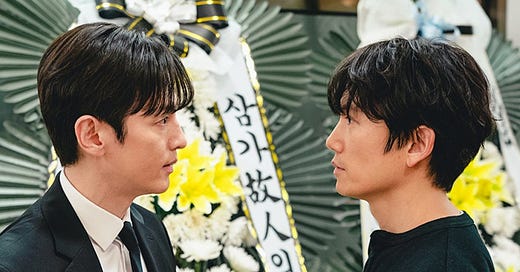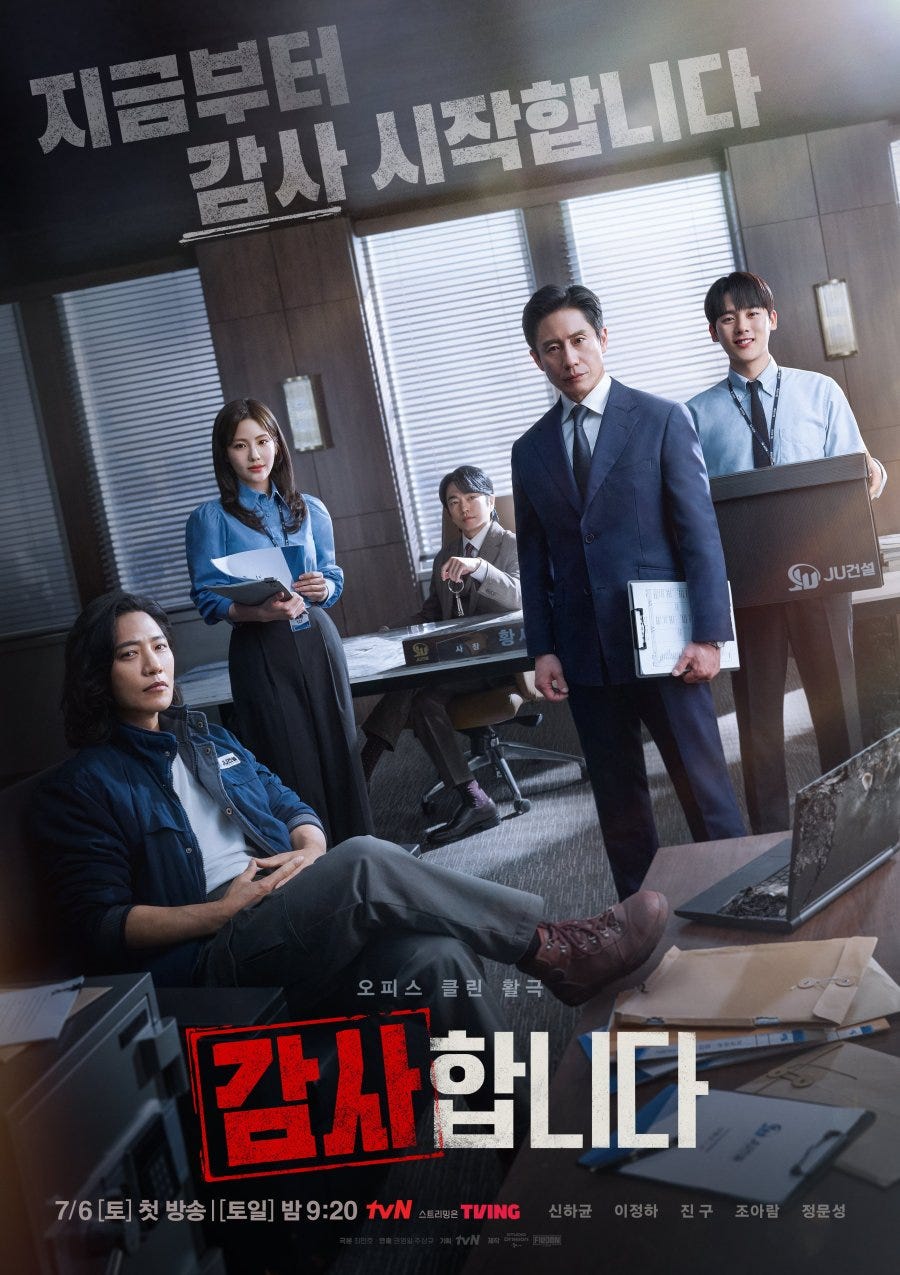Connection (2024) In the final analysis... The Auditors (2024) Early Impressions
The seven deadly sins are alive and well in K dramas and nowhere have they been better depicted in recent days than in the concluded Connection. I recently heard a group of theologians making reference to Augustine of Hippo and his coinage of the term “disordered loves”. What a person is understood by what they love. According to this line of thought a miserable life filled with conflict and dissatisfaction stems from misplaced priorities. In that vein, Augustine describes sin as “disordered love”. The result are unhappy lives. All this presumes of course that there is such a thing as a proper ordering of love, shared values — that have a common source and are for the good of all. For Augustine “the good” or virtues are defined by a transcendent being who has revealed himself to his creation.
For instance: When the word “friend” is uttered in the drama, one feels the full force of its irony. No one watching Connection comes away convinced that any of these men know its meaning. In the words of the great rhetorician Inigo Montoya, they keep using that word but show no real understanding of it. They are more like collaborators, convenient allies even co-conspirators in a scheme that span the large part of a lifetime. They worship at the altar of mammon and are bound together by expediency. Their tragic story begins in high school when a boy dies. His death is immediately covered up in unseemly haste as an accident with the aid of a particularly powerful parent. The friend group clams up because they see the benefit of a wealthy ally. Two decades later, another death occurs. It’s not immediately clear how the man dies but the answer to that question doesn’t seem immediately important except that all the relevant players are suspiciously scrambling to cover their rear ends. The shared goal is mammon. Lots of it. Enough to bend the rules. Enough to cheat, lie and kill for. Disordered love is messy and so is disentangling the consequences.
As has been discussed here previously, the disordered love for money is the cause of many many evils. Few would extol poverty for its own sake but many a wiser person would note that money is a far better servant than it is a master. Its misjudged importance can destroy lives in one fell swoop. Jong-soo, the chaebol heir apparent outwardly has it all except the perspicacity and brains to be his father’s true successor. His birthright entitles him to wealth but he has to rely on the farmer’s son, now prosecutor Park Tae-jin to scheme perfectly and clean up after him. Blood is no guarantee that the energy and intelligence of one generation will be demonstrated by the next. Money can buy connections undoubtedly. Money can even buy allies. But money can’t buy loyalty. Loyalty and friendship are loves that come from a very different place that goes beyond material benefits.
It has reached the point of banality to say that when good people sit on the sidelines, evil runs amok. It gains a certain perverted boldness that leads to death. High school Park Seo-jun was put in an untenable position, which no child should have to be in — to protect his parent. When he’s a father himself, he finds himself in yet another pivotal dilemma, to save his child using illegal means. The Mephistophelean Park Tae-jin manipulates Seo-jun’s love for his daughter to distribute an addictive substance illegally. Their ill-gotten gains soon become a bone of contention among the cronies eventually leading to a falling out and even literal backstabbing.
Like Jeon Mi-do’s Yun-jin is constantly on a moral see-saw. Her need for money does see her enter into all kinds of dubious transactions and also keeps her from being as forthcoming as she should be under the circumstances. Her journalistic integrity is tainted because of her desperate need to accumulate wealth in the quickest possible time. Her desire to be close to her daughter is what drives her financial goals and on the surface of it, it may seem harmless until it hampers an investigation or allows shady characters to slip through the cracks.
Corruption is inherently destructive because as the story demonstrates, there are moral laws — written and unwritten — that govern the world. Evil inevitably divides and madness ensues. The disordered love of wealth tears them all apart. Justice is a pipe dream. The detective’s role is to restore that order. But in order to do so, he has to come clean himself. The guilt he feels over Jun-seo’s death niggles at him. He too is tainted by the drug that was forced on him. He made difficult choices over it. It almost became his Achilles’ heel. Yet without his unfailing resolve to get to the end of the story, and with a little help from his friends, the truth might never see the light of day. Even the detective is governed by the moral laws. He bends and breaks them to his own detriment. He is the imperfect agent to remind that even while everyone falls short, there is an ideal that all should aspire to.
The Auditors is a new series revolved around an audit team based in a corporate construction firm headed by Hwang Se-ung (Jung Moon-sung) and Hwang Dae-ung (Jin Goo) as the company’s CEOs. Shin Ha-kyun, seen last year in Evillive, is the unflappable leader of the titular team, Shin Ha-Il. This recent offering from tvN is styled more like a police procedural than a workplace exploration of forensic accountancy. Shin Cha-Il is a stoic figure sprung from the mould of Sherlock Holmes. He is reticent, dogged and laser-focused in getting to the bottom of things. He’s been hired by the company’s newly installed CEO, much to the chagrin of many, to shake things up. From the looks of the first few episodes, a change in the status quo is desperately needed if the company is to survive the rest of the 21st century.
In these early episodes, the show appears reminiscent of the 2019 hit Hot Stove League. Like his counterpart, not only does Shin Cha-Il have to play detective but navigate a power struggle between two men who clash about how business should be done. At first glance Jin Goo’s Hwang Dae-ung seems like the bad guy deliberately running interference but it becomes more apparent that he belongs to the school of thought that says “if it ain’t broke, why fix it?” According to him the old ways through connections, cronyism and kickbacks got the job done pretty well. Of course the problem with “the old ways” is that it has allowed corruption to take root as it always does which means loss of money and even preventable fatalities.
In the curious case of the collapsed tower crane everything appears at first to be an accident. But the human bloodhound that is Shin Cha-il mows through fierce opposition internally and externally to sniff out enough clues to cast doubt on the original conclusion.
As was the case with Beyond Evil, there’s a rookie. There’s almost always a rookie in these kind of police procedural. The role of the rookie is fairly standard. To make mistakes, get chastised and ask all the right questions so that the smarter more experienced people can do the exposition dumps. But the rookie is also positioned as a contrast to the cynical jaded world-weary male lead. He’s the idealist believing in the inner good of his fellow human beings. Surely Mr X is a good guy. He can do no wrong. At the start he wanders into situations with clueless zeal which tends to annoy. He’s on a journey of discovery initially groping around in the dark looking for answers about the contradictory nature of humanity. The world out there is his classroom. How can so-called “good people” do bad things? Well, under the right set of circumstances and the right temptations waved under one’s nose — quite easily actually. The rookie’s motivations are mixed. Yes, there’s a desire to do good for one’s neighbours while making noteworthy achievements early in one’s career.
Then there’s the more savvy rookie. A sharp young woman who is connected with the deputy CEO. She knows him as an uncle figure and brings out another side to him. A more affectionate and more likeable side. In their interactions, it seems that the deputy CEO is a much more naive figure than one might think. He’s an proponent of the old ways because they seem to work but he has been blinded (perhaps by his subordinates) from the consequences of doing under the table deals. Among his faults is simplistic thinking about taking shortcuts or greasing palms. She’s troubled about his approach to running the company and wonders about the lines that are being crossed with his involvement in each case.
In these early episodes clear that JU Construction is in need of revitalization. Not from hostile influences or competitors but from its own staff. Especially the long time personnel who have made a playground of the company’s unpoliced accountability structure even what little there is of it. A flushing out of the stables seems needed. Whatever pushback he gets as he scrutinizes every nook and cranny the untouchable Shin Cha-il seems to be the man to get the ball rolling.




